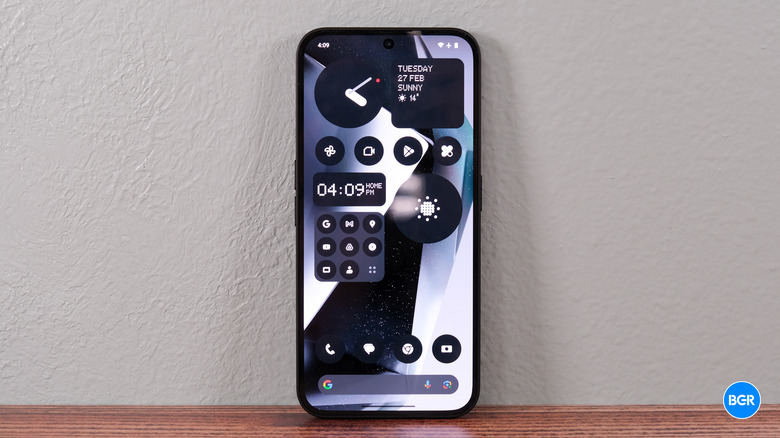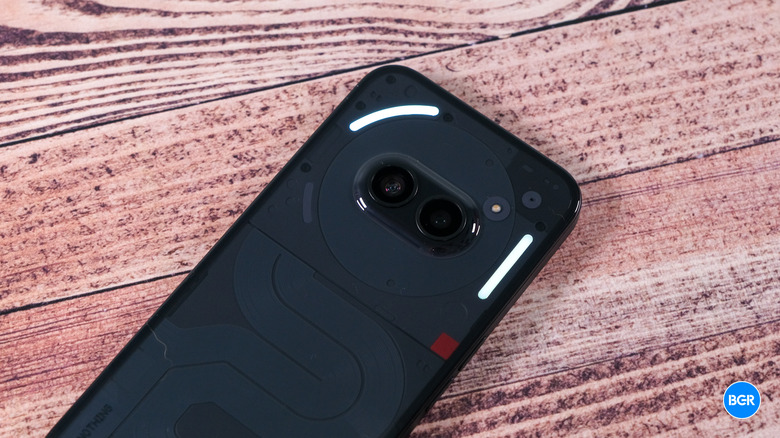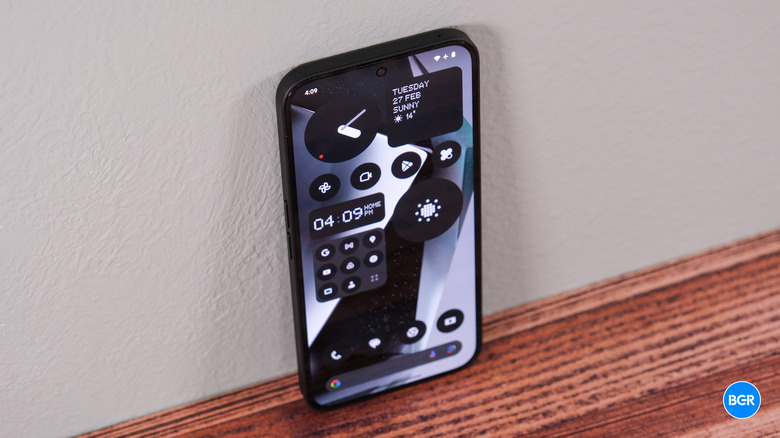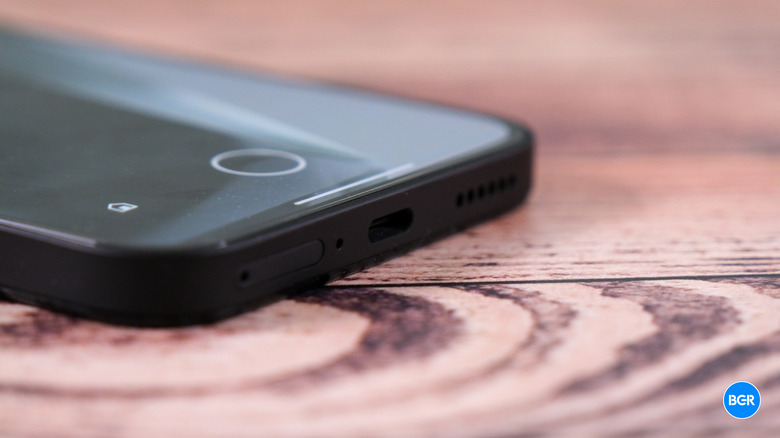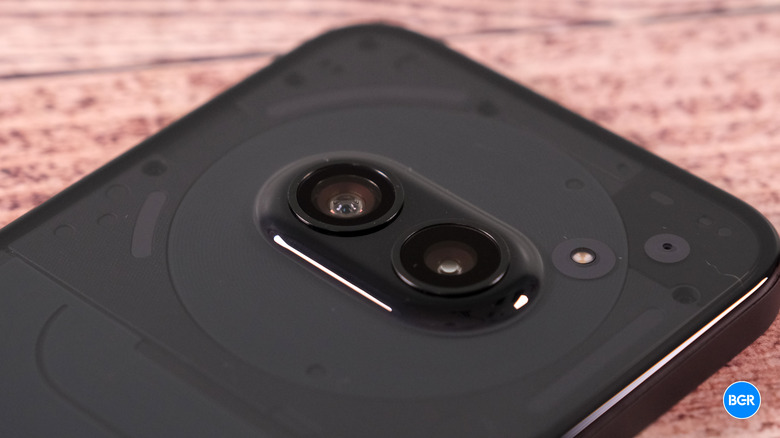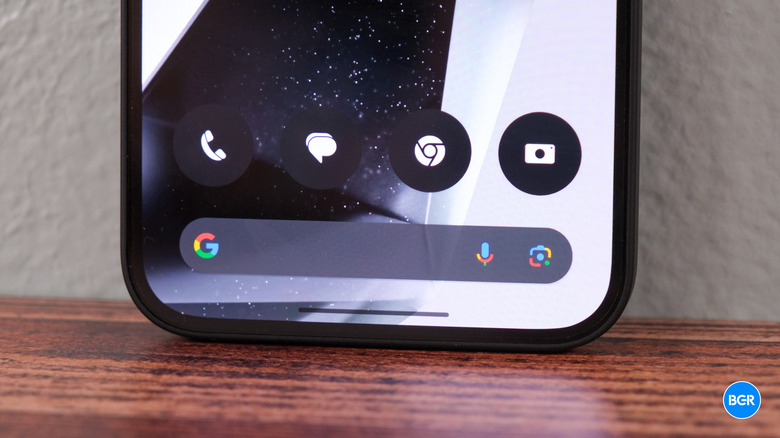Nothing Phone 2a Review: Unique On A Budget
- Cool unique design
- Solid performance
- Good battery life
- High-end display for the price
- Inexpensive
- No wireless charging
- Camera isn't great
| Buy From | List Price | Sale Price | |
|---|---|---|---|
| Nothing | $349 | $349 | See It |
Nothing could well be the hottest new smartphone brand in some time. After the success of the Nothing Phone (1) and its follow-up, the Nothing Phone 2, the company is expanding its portfolio a little, with the launch of a new budget phone — the Nothing Phone 2a. In retrospect, it seems obvious that the Nothing Phone 2a was coming — in only its second phone, Nothing did away with the ultra-affordable-flagship concept, raising the price of its device a little in favor of improving performance, and making room for a second, budget option.
The Nothing Phone 2a keeps many of the things that customers love about the Nothing Phone 2, like the glyph interface and the unique take on software. But, it's also cheaper than the Nothing Phone 2, despite the fact that the Phone 2 is still a relatively affordable $599.
Does the Nothing Phone 2a do enough to keep what's great about Nothing?
Nothing Phone 2a specs
| Dimensions | 6.37 x 3 x 0.34 inches |
| IP rating | IP54 |
| Display resolution | 1084 x 2412 pixels |
| Display size | 6.7 inches |
| Display type | AMOLED |
| Display refresh rate | 30-120Hz |
| Display brightness | 1300 nits peak |
| Chipset | MediaTek Dimensity 7200 Pro |
| Memory | 8GB, 12GB |
| Storage | 128GB, 256GB |
| Rear cameras | Wide: 50MP, f/1.8, OIS Ultrawide: 50MP, f/2.2, 114-degree |
| Video | 8K 30fps, 1080p 240fps |
| Front camera | 32MP, f/2.2 |
| Ports | USB-C |
| Battery size | 5,000mAh |
| Charging | 45W wired |
| Connectivity | Bluetooth 5.3, Wi-Fi 6, 5G |
| Colors | Black, White |
| Price | $349 |
Nothing Phone 2a design
The design of the Nothing Phone 2a is very reminiscent of the Phone 2, but there are some surprises — design elements that set it apart from both other Nothing phones and other devices in the industry.
Like other Nothing devices, the Phone 2a has a transparent back, with a Glyph interface that can illuminate for things like notifications. We'll get more into what you can use the Glyph interface for later, but I quite like the look — and while the glyph is arranged a little differently compared to the Phone 2, the overall effect is the same.
The other aspect of design that takes a little getting used to is the placement of the cameras. The dual camera array is placed in the middle towards the top of the phone, rather than on the top left, like pretty much every other phone out there right now. It's not a bad look by any means, but again, it takes a little getting used to.
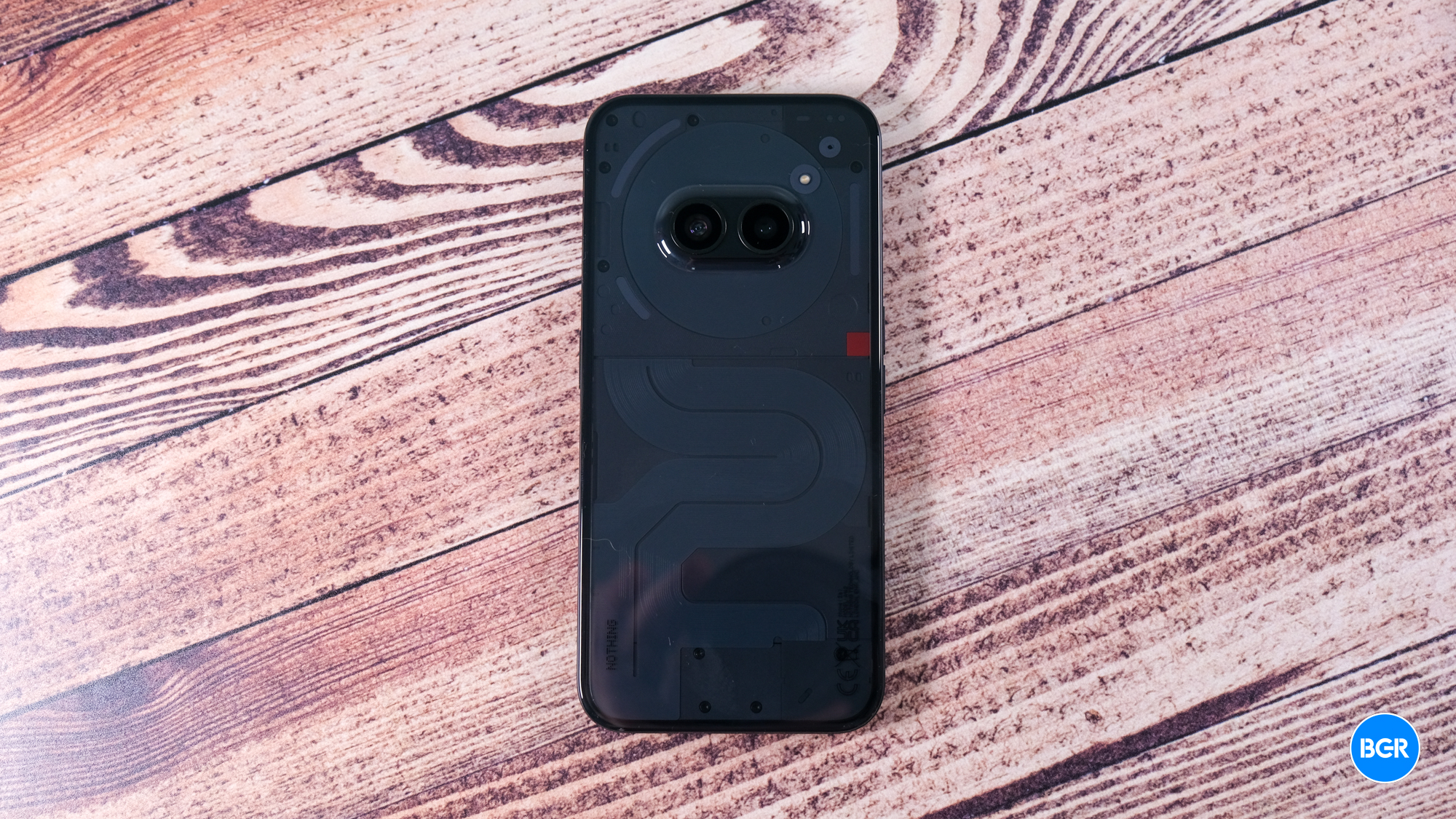
The rest of the device is largely to be expected, design-wise. There's a squared-off frame, which is made from a matte black graphite, and a USB-C port at the bottom. There are two volume buttons on the left side and a power button on the right.
Generally, I like the look of the Nothing Phone 2a. It keeps the design sensibilities of other Nothing devices, and while aspects of it are a little cheaper, like the frame, it still feels more premium than you might expect.
Nothing Phone 2a display
The display on the Nothing Phone 2a looks great. The 6.7-inch display has a resolution of 1084 x 2412 pixels, with a refresh rate that can range between 30Hz and 120Hz. It's a good-looking panel, and while I would have liked to see a higher resolution, a high refresh rate definitely has a bigger impact on day-to-day use.
The phone has a peak brightness of 1300 nits, and while it's not quite as bright as some of the competition, I still found it easily bright enough for the vast majority of situations, including outdoor use.
Nothing Phone 2a performance
The Nothing Phone 2a is Nothing's first phone with a MediaTek chip, and it has a MediaTek Dimensity 7200 Pro, which is an updated version of the Dimensity 7200 that was co-engineered with Nothing. The new chip is built on the same 4nm process as many flagship Android chips, and has the same 2.8GHz clock speed — however, according to Nothing, it's "better-tuned" for things like power draw from the display and modem. The processor is coupled with either 8GB or 12GB of RAM, depending on the model.
On top of the chip, the phone has Nothing's liquid cooling system, with a vapor chamber that Nothing claims allows for fast heat dissipation. It's a little hard to judge how much of an impact this actually has, especially given the fact that the chip isn't available in any other phone.
All that to say, the phone performs pretty well. To be clear, it's simply not going to perform as well as more expensive, more powerful phones, but for the price, it performs quite well. In day-to-day use, I found the phone to react quickly to touch, and load games relatively quickly.
Nothing Phone 2a battery and charging
Powering the phone is a 5,000mAh battery, and I found that it was easily able to last a full day of even heavier use and part-way into the next day. It's not as impressive as, say, a device like the Galaxy S24 Ultra, however, most users will have no problem with the battery life on offer here.
The charging setup is a little less impressive. The phone supports 45W fast charging using the Nothing charger, and while 45W isn't bad, it's not excellent. Even worse is the fact that there's no wireless charging support here at all, which is a huge miss. In 2024, no phone should be launched without wireless charging.
Nothing Phone 2a camera
The Nothing Phone 2a comes with a dual camera system, which is made up of one 50-megapixel main camera and one 50-megapixel ultrawide camera. It's a solid setup, and to be expected of a phone in this price range — however it would have been nice to see a telephoto camera here too. Unlike some other phones with high-resolution main cameras, Nothing does not offer lossless 2x zoom through the main camera, so you'll have to rely on digital zoom.
The camera quality is probably the worst thing about this phone. In well-lit environments, images aren't bad by any means. The quality isn't terrible in most normal situations, but it introduces a slightly more challenging scenario to the mix, and images suffer. For example, if there's any backlighting or zoom images look washed out and colors overly saturated. Low-light performance isn't great either.
Again, when you're not in one of these challenging scenarios, images don't look bad at all, for a phone at this price. Just expect to get the odd dud every now and then.
Nothing Phone 2a software
One of the things that customers love most about Nothing phones is its approach to software. The phone features Nothing OS 2.5, with its pixel-based, monochrome look. It's a good look, and while it's altered compared to stock Android, it does still feel stripped-back and simple, which is always nice. Nothing has expanded its library of widgets too, to include widgets for things like the camera and media player.
There are some performance-enhancing features here too. Nothing has included a Smart Clean feature that it Nothing claims regularly cleans out unused system files, along with a so-called RAM Booster that uses storage as virtual RAM to keep apps running for longer.
Then there's the Glyph Interface, which has become a big part of the identity of a Nothing phone. The Glyph Interface can be used to get a visual representation of things like your timer, or the volume of media you're looking at. And, Nothing has a Glyph Composer that can be used to create Glyph animations for ringtones. And, like previous Nothing phones, the device supports the "Essential Glyph" notifications that allow you to set specific types of notifications to illuminate the Glyph Interface.
I really like how Nothing approaches software, but I do find that the apps that don't embrace the look stick out a little too much. That's hardly Nothing's fault, though.
Conclusions
The Nothing Phone 2a is a killer phone for the price, though it's not without its faults. The phone offers a great-looking screen and interesting design, with good performance for a phone in this price range. The main downside to the phone is the fact that the camera isn't all that great, but hopefully, it will improve a little over time — and it's hard to expect a flagship-level camera in a phone this cheap.
The competition
The Nothing Phone 2a does have some competition. If you have a phone to trade in, you can get the OnePlus 12R down to $400, and it's a far better option when it comes to specs and camera performance. There's also the Samsung Galaxy A54, which again, has a better camera. If, however, you're attracted to the Nothing Phone 2a for its interesting design and unique approach to software, it's still an excellent phone.
Should I buy the Nothing Phone 2a?
Yes, but keep in mind that there are better phones for things like camera performance.
